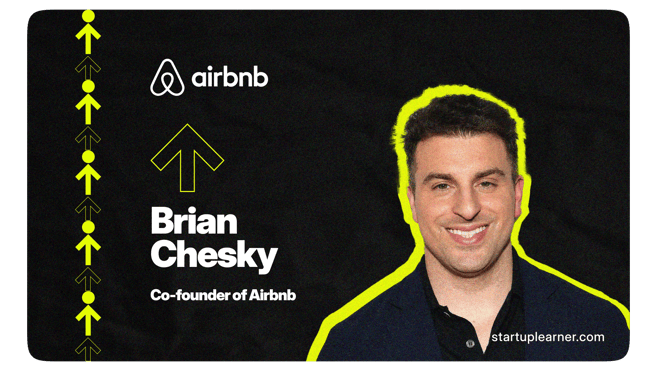How Brian Chesky Turned an Air Mattress Into a $100 Billion Disruptor
FOUNDERS
Startup Learner
4/10/20253 min read



Introduction
Brian Chesky didn’t start out aiming to build a global travel brand. In fact, he was just trying to pay rent. But what started with renting out air mattresses to strangers became one of the most iconic startups in the world — Airbnb. His journey is a masterclass in grit, creativity, and seeing opportunity where others see problems.
Early Life and Background
Born in Niskayuna, New York, in 1981, Brian Chesky grew up in a middle-class family. His parents were both social workers, and from an early age, Chesky showed signs of a creative mind. He loved drawing and design, and eventually went on to study at the Rhode Island School of Design (RISD), where he graduated with a degree in Industrial Design.
While his peers pursued stable design jobs, Chesky leaned toward entrepreneurship. RISD is also where he met Joe Gebbia, his future co-founder. Though Chesky didn’t have a background in tech or business, his design mindset — focused on user experience, form, and function — would later become a major asset.
The Big Idea: Where Airbnb Started
In 2007, Chesky moved to San Francisco with Joe Gebbia. Struggling to afford rent, they noticed that a design conference was happening in the city, and all hotels were fully booked. The duo had an idea — they bought a few air mattresses, created a simple website, and offered “Air Bed & Breakfast” to attendees.
Three guests stayed with them, and the experience wasn’t just positive — it was eye-opening. The idea of staying in someone’s home, getting local recommendations, and saving money created a more personal travel experience. The prototype had legs.
Chesky and Gebbia soon brought on a third co-founder, Nathan Blecharczyk, a technical whiz who helped them build out the platform. Airbnb was born — but not without serious hurdles ahead.
Building the Company: From Rejections to Breakthrough
The early days were anything but smooth. Airbnb was rejected by multiple investors. One famously told them, “People will never trust strangers enough to sleep in their homes.” Chesky and team were broke, living off cereal, and even made custom Obama-themed cereal boxes ("Obama O’s") to raise money.
Their big break came in 2009 when they got into Y Combinator, the legendary startup accelerator. Paul Graham, co-founder of YC, was initially skeptical but impressed by their hustle. He gave them $20,000 in seed funding and one key piece of advice: go meet your users. The founders personally traveled to cities where hosts were listing homes and helped them improve their photos and listings. This founder-driven approach to user experience became part of Airbnb’s DNA.
Trust was the biggest hurdle — and Chesky knew it. The team doubled down on design, safety, and a seamless user experience. Gradually, users and hosts began to trust the system. Word of mouth took over.
By 2011, Airbnb had expanded to 89 countries. By 2015, they had more than 1 million listings. Today, Airbnb operates in over 190 countries and is valued at over $100 billion.
Lessons for Founders
Brian Chesky’s journey is packed with valuable insights for aspiring entrepreneurs:
1. Solve real problems, even small ones.
The idea began as a way to pay rent — but solving their own problem led to something millions needed.
2. Design matters.
As a design founder, Chesky believed that aesthetics, trust, and user flow were critical to product adoption — especially when convincing people to open their homes to strangers.
3. Talk to your users.
The Airbnb team spent time with hosts, improved listings, and listened — a practice that fueled product-market fit.
4. Hustle smart.
From cereal box fundraising to sleeping on floors during pitch meetings, Chesky’s grit and creativity helped Airbnb survive when most startups would fold.
5. Culture is a competitive edge.
Airbnb is known for its mission-driven culture. Chesky personally led a company-wide reset to ensure values stayed strong, even during scale.
The Impact
Airbnb didn’t just disrupt hotels — it redefined what travel could look like. It created the sharing economy era, proved that trust could be designed, and gave people new income streams and ways to explore the world.
The platform’s impact extends to policy, urban development, and even post-pandemic digital nomad culture. In many ways, Chesky became the face of a generation of startups that believed people-first design could change the world.
Today, Chesky continues to lead Airbnb as CEO and is a prominent voice in both design and startup communities. He’s also committed to philanthropy, pledging to donate the majority of his wealth through the Giving Pledge.
Conclusion
Brian Chesky’s story proves that you don’t need an MBA to build a billion-dollar company. You need vision, grit, and the courage to reimagine how the world works. From air mattresses to IPO, Chesky showed what happens when you follow the problem, not the trend.
For founders, the lesson is simple:
Start small, solve real problems, and never underestimate the power of design.



